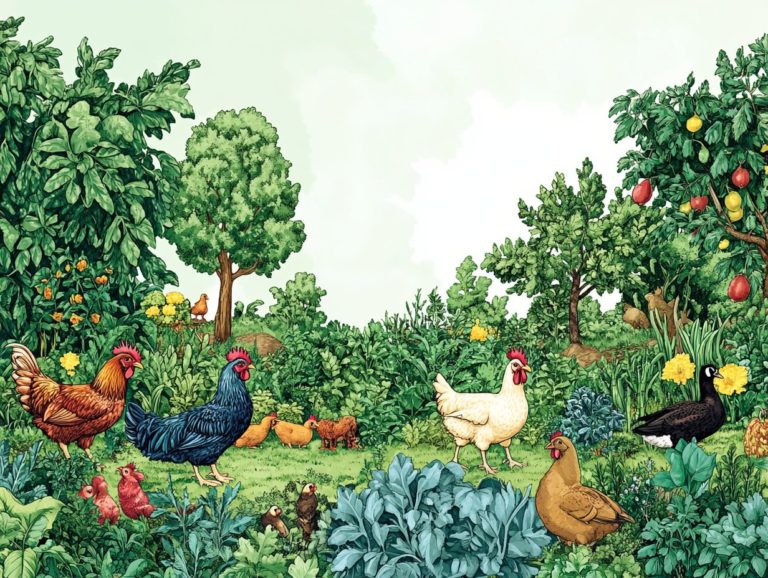What is the Role of Fungi in Permaculture?
Fungi play a vital role in permaculture, acting as essential contributors to ecosystem health, soil vitality, and sustainable agriculture, including species like oyster mushrooms and King Stropharia.
Fungi enhance nutrient cycling and offer natural pest control.
They also provide edible and medicinal benefits, making them indispensable in cultivating resilient systems.
Let s dive into the fascinating world of fungi! This article invites you to explore the multifaceted contributions of fungi, practical methods for incorporating them into your permaculture design, including mushroom cultivation techniques, and the challenges you may encounter along the journey.
Discover how leveraging these remarkable organisms can elevate your permaculture practices and foster a thriving ecological community.
Contents
- Key Takeaways:
- Why Fungi Matter in Permaculture
- How Fungi Keep Soil Healthy
- Using Fungi for Pest Control
- Fungi as a Source of Food and Medicine
- Integrating Fungi into Permaculture Design
- Challenges and Considerations
- Frequently Asked Questions
- What is the Role of Fungi in Permaculture?
- How do Fungi contribute to soil health in Permaculture?
- Can Fungi be used as a natural pest control method in Permaculture?
- What is the significance of Fungi in the nutrient cycle of Permaculture?
- How do Fungi promote biodiversity in Permaculture?
- Are there any specific types of Fungi that are beneficial in Permaculture?
Key Takeaways:
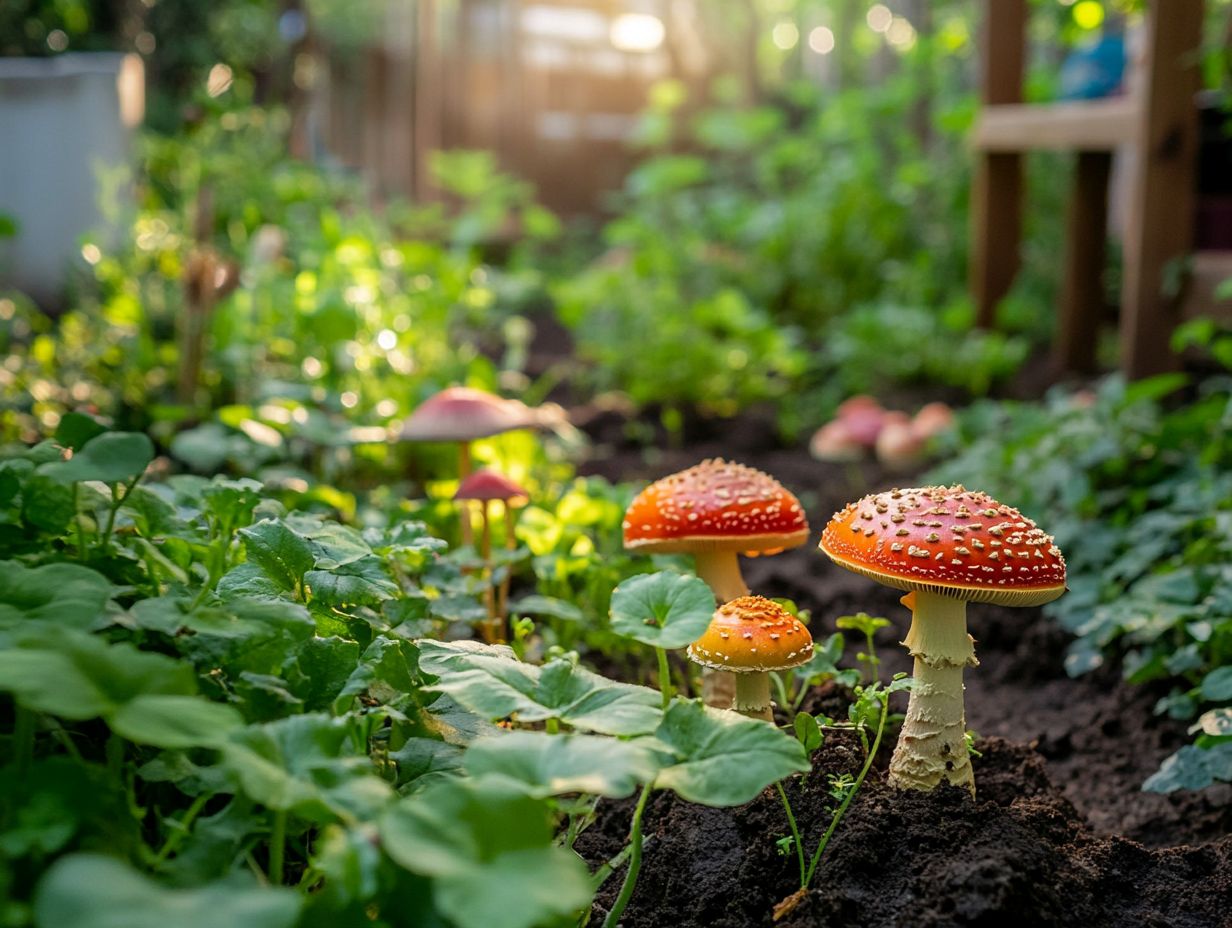
- Fungi play a crucial role in maintaining healthy ecosystems and are essential for the success of permaculture practices.
- They contribute to soil health by aiding in nutrient cycling and improving plant growth.
- Using fungi for pest control offers a natural and sustainable alternative to chemical pesticides.
Why Fungi Matter in Permaculture
Understanding fungi in permaculture is crucial for cultivating resilient agricultural systems. These systems embody principles like earth care, people care, and fair share concepts championed by visionaries like Paul Stamets and Bill Mollison.
Fungi serve vital roles in bolstering biological diversity, nurturing healthy ecosystems, and enhancing soil health through processes like cleaning up the environment and nutrient cycling.
By incorporating fungi into your permaculture practices, including mushrooms like Shiitake and Chanterelles, you can create sustainable agricultural methods that not only produce food but also foster ecological balance and community-based strategies.
How Fungi Boost Ecosystem Health
Fungi are essential players in ecosystems, significantly boosting biodiversity and the overall health of our environment. Take mycorrhizal fungi, for instance; they form symbiotic relationships with plants, enhancing nutrient uptake and improving soil structure.
These interactions are vital for plant health, granting access to essential minerals and water. Saprophytic fungi, such as King Boletes, decompose organic matter, transforming dead and decaying material into nutrients that enrich the soil.
This process facilitates nutrient cycling and supports the diverse array of life forms that depend on healthy soils for their growth.
The numerous contributions of fungi whether it s aiding in plant growth or enhancing biodiversity through methods such as mushroom patches underscore their critical role in sustaining vibrant ecosystems.
How Fungi Keep Soil Healthy
The role of fungi in soil health is crucial, serving as a cornerstone for maintaining vibrant ecosystems and nurturing biological diversity, including through the use of mushroom beds and integrated systems.
By facilitating nutrient cycling, fungi effectively break down organic matter and improve soil structure, which in turn promotes healthier plant growth and enhances carbon management.
This intricate relationship not only enhances resilience against environmental degradation but also enriches the overall health of the ecosystem, supporting sustainable agriculture practices.
Ready to boost your garden s health? Start your fungi journey today!
How Fungi Contribute to Nutrient Cycling
Fungi hold a pivotal role in nutrient cycling, expertly breaking down organic matter into the essential nutrients that plants eagerly absorb. This process sustains both forest ecosystems and agricultural landscapes. It not only promotes soil health but also nurtures vibrant ecosystems.
These remarkable organisms take on the vital task of decomposing leaf litter, dead animals, and various organic materials, including mushrooms. They transform these materials into substances that enrich the soil. Many fungi also form symbiotic relationships with plant roots, particularly fungi that work with plant roots and species like Reishi, which significantly enhance nutrient uptake.
With their extensive hyphal networks, fungi bolster the absorption of crucial elements like phosphorus and nitrogen, ultimately benefiting plant health and growth, which is essential for food security. This intricate partnership does more than just stabilize soil structure; it ensures a continual replenishment of nutrients, forming a cornerstone of a healthy, functioning ecosystem through the use of permaculture principles.
Using Fungi for Pest Control
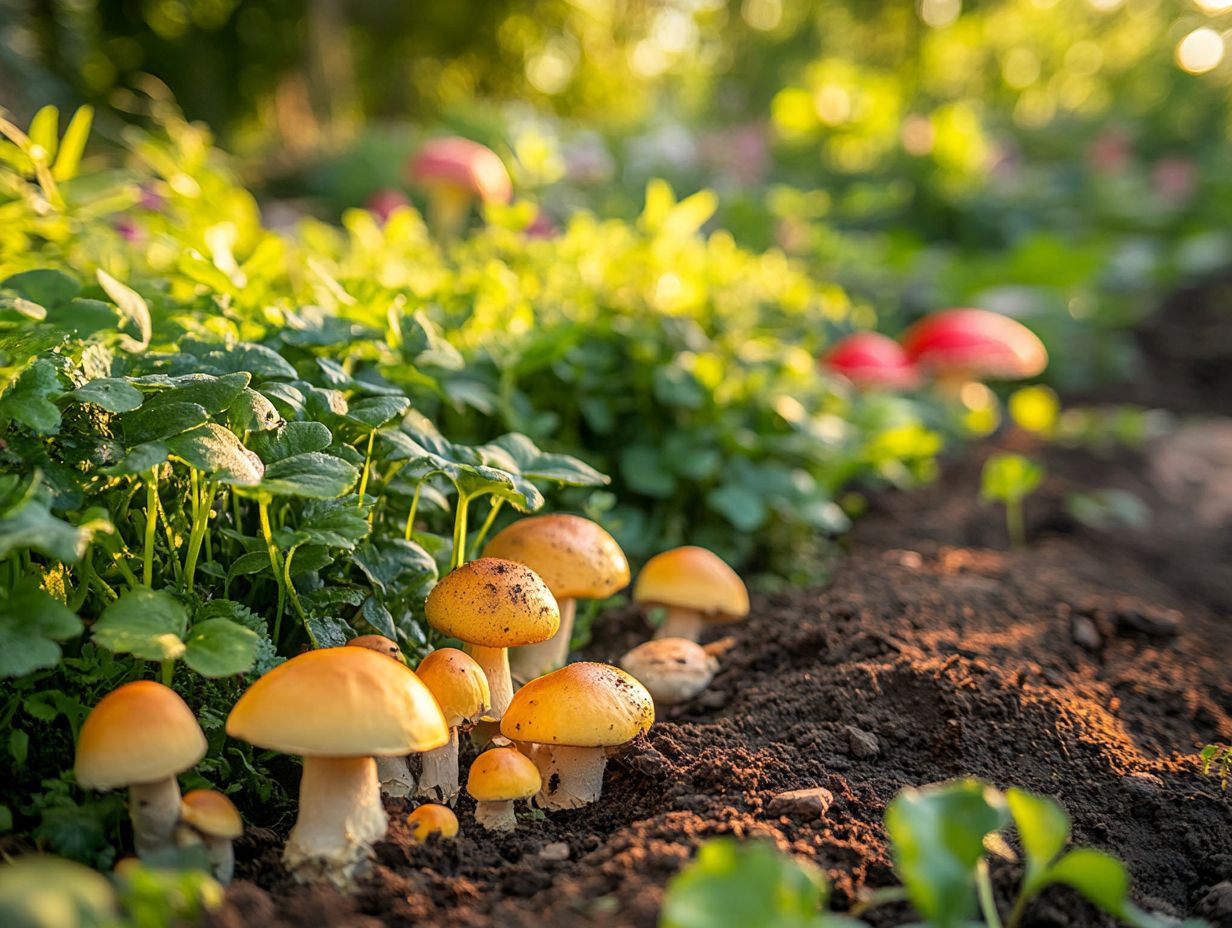
Utilizing fungi for pest control presents you with a sustainable approach to agriculture. It provides natural alternatives to chemical pesticides, including strategies involving mushroom response teams.
Fungal species, like fungi that target insects, including Cordyceps militaris, can effectively target pests while fostering ecological balance and enhancing overall health.
Natural Alternatives to Chemical Pesticides
Natural alternatives to chemical pesticides can include a variety of fungal species, including Oyster mushrooms, that effectively manage pest populations while preserving the ecological balance.
Beneficial fungi like Trichoderma and Beauveria bassiana, as well as other medicinal mushrooms, are particularly noteworthy. They not only infect and control pests but also enrich the soil with their organic compounds. This dual action offers a sustainable solution for pest control while promoting a healthier ecosystem by enhancing soil structure and fertility, supporting the organic movement.
By utilizing these fungal species, you can significantly reduce chemical runoff, which in turn safeguards waterways and fosters biodiversity, crucial for maintaining ecological health. The ecological advantages include encouraging natural predator populations, ultimately creating a balanced environment where plants can thrive and resist pest invasions more effectively, enhancing food security.
Incorporating these alternatives into your agricultural practices fosters lasting sustainability! It includes community-based strategies and resilience against pests, ensuring a more harmonious relationship with the environment.
Fungi as a Source of Food and Medicine
Fungi are an exceptional treasure trove of nourishment and healing. Numerous species, such as gourmet mushrooms, present you with both exquisite culinary experiences and remarkable medicinal properties.
Gourmet mushrooms like Shiitake, Chanterelles, and King Stropharia are not just celebrated for their rich flavors; they elevate your culinary creations and can be integrated into mushroom beds. Meanwhile, medicinal varieties such as Reishi (or ganoderma lucidum) and others are revered for their profound health benefits, making fungi an essential addition to your diet and wellness regimen.
Start incorporating fungi into your gardening today for a healthier, pest-free environment!
Edible and Medicinal Fungi in Permaculture
Edible and medicinal fungi like Reishi, Shiitake, King Stropharia, and Oyster mushrooms are essential in permaculture systems. They provide both nutritional and therapeutic benefits.
These incredible fungi boost soil health and biodiversity. They act as natural pest deterrents and compost accelerators while supporting perennial crops.
You can easily grow Shiitake mushrooms on logs or sawdust. Reishi thrives in shaded areas, making them perfect for underutilized spaces in your garden.
By integrating these fungi, you can supercharge your self-sufficiency and transform your permaculture experience while promoting sustainable practices and mushroom ethics.
Integrating Fungi into Permaculture Design
Integrating fungi into your permaculture design is vital for creating systems that maximize productivity while maintaining ecological balance through effective zone design.
By applying zone design principles and cultivating various mushroom species, including fungi that form beneficial partnerships with plant roots, you can significantly enhance your food systems and promote soil health.
Methods for Incorporating Fungi in Permaculture Systems
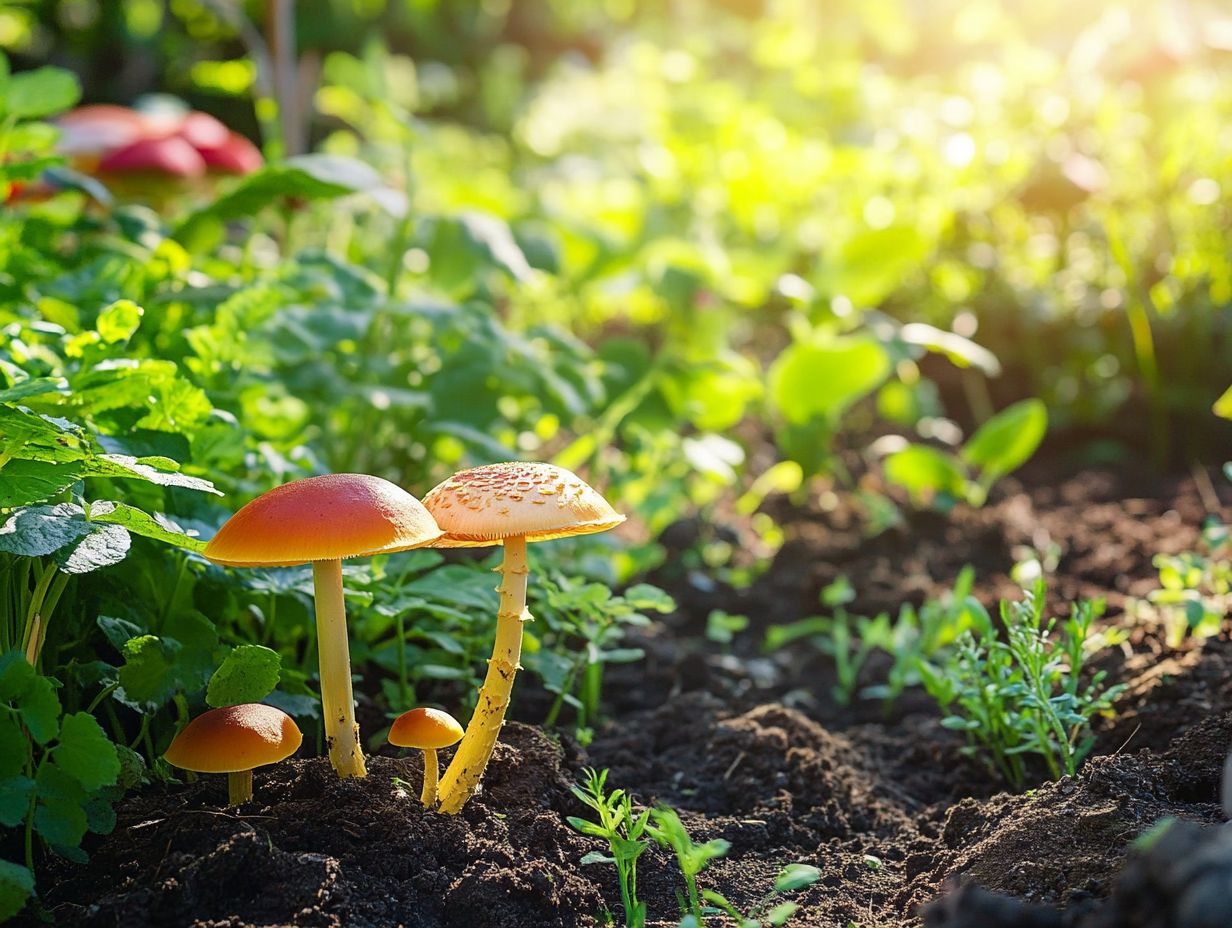
Incorporating fungi into your permaculture systems can be achieved through various mushroom cultivation methods, including mushroom beds and strategic zone implementation. These practices enhance soil health and biodiversity while supporting sustainable food production.
By utilizing techniques like shady microclimates and companion planting, you can create ideal conditions for mycelium growth and the development of various mushroom species. This allows these fascinating organisms to thrive alongside other plants.
The careful placement of fungi, such as King Boletes, within the zones of your permaculture design can maximize their benefits, such as nutrient cycling and moisture retention.
Intermingling fungi with root vegetables or fruit trees taps into symbiotic relationships that enhance yields and support a robust ecosystem, contributing to the resilience of your agricultural landscapes.
Challenges and Considerations
Integrating fungi into permaculture systems presents numerous benefits, but it s essential to consider the challenges that accompany this practice, especially in sustainable agriculture, community-based strategies, and effective land management.
By understanding these potential obstacles, you can navigate your mushroom cultivation efforts more effectively and successfully.
Potential Challenges and Solutions for Using Fungi in Permaculture
The challenges you may encounter when incorporating fungi into permaculture often require innovative solutions and adaptive strategies to maintain sustainable practices.
These challenges can vary widely, from understanding the specific environmental needs of different fungal species some of which may struggle in particular soil types or climates to managing their interactions with other organisms.
You may face competition from aggressive weeds or pathogenic organisms that can inhibit fungal growth. To address this, consider companion planting, which optimizes plant relationships and enhances ecosystem health.
By educating yourself about soil microbiomes, you can create a balanced environment that amplifies the beneficial roles of fungi. Observing how various fungal species interact harmoniously with native plants can reveal exciting opportunities for developing more resilient agroecosystems.
Frequently Asked Questions
What is the Role of Fungi in Permaculture?
Fungi play a crucial role in permaculture. They break down organic matter, cycle nutrients, and form beneficial relationships with plants.
How do Fungi contribute to soil health in Permaculture?
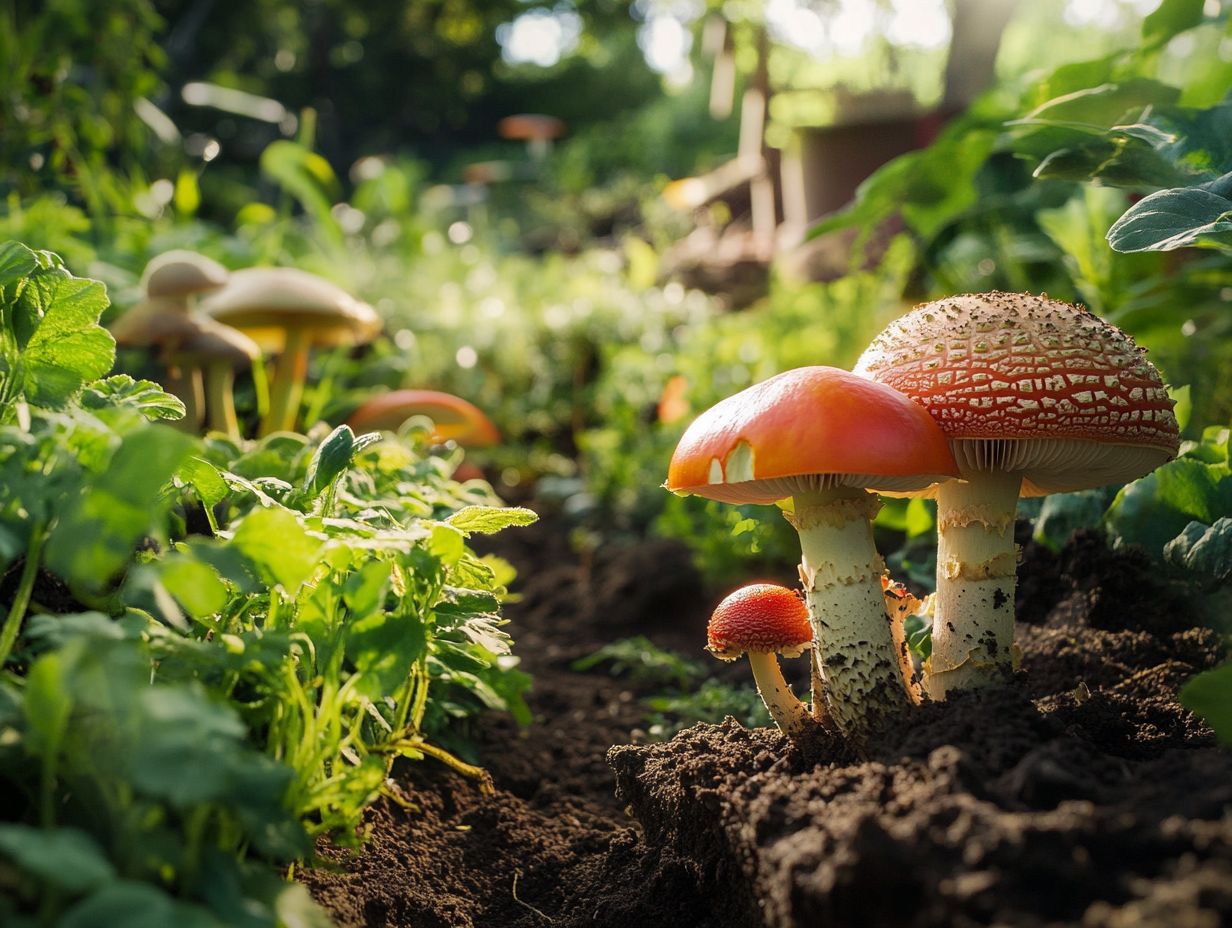
Fungi form symbiotic relationships with plant roots, called mycorrhizae. These relationships enhance nutrient uptake and improve soil structure.
Can Fungi be used as a natural pest control method in Permaculture?
Yes, specific fungi can naturally control pests and diseases. This reduces the need for harmful chemicals in permaculture gardens.
What is the significance of Fungi in the nutrient cycle of Permaculture?
Fungi break down complex organic materials. They release essential nutrients like nitrogen, phosphorus, and potassium, which are vital for plant growth.
How do Fungi promote biodiversity in Permaculture?
Fungi create a diverse ecosystem in permaculture gardens. They provide habitats for microorganisms, insects, and other beneficial organisms.
Are there any specific types of Fungi that are beneficial in Permaculture?
Yes, certain fungi are particularly beneficial. Mycorrhizae, saprophytes, and decomposers help improve soil health and support plant growth.

